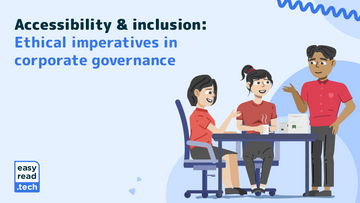Accessibility and inclusion: Ethical imperatives in corporate governance

Illustration by Justin Olivares.
Corporate governance and the business landscape are constantly evolving. Technological advances have changed the way organisations operate and meet the needs of the people they serve and are accountable to. Furthermore, the boom of ‘shareholder activism’ in the 1970s meant the dismantling of the then-stable hierarchy that placed businesses and their directors at the top, while seemingly powerless individuals were placed at the bottom.
Today, society also clearly sees and values the correlation between a successful organisation and good governance, based on a foundation of strong, ethical, and purpose-driven principles. When thinking of a ‘good company’, the modern consumer likely envisions a company that values their members, employees, and the public, embraces diversity, and is aware of and actively addresses their environmental and social impact. This is in comparison to a company that is solely driven by the pursuit of excessive profits and neglects its broader responsibilities in an evolving and tumultuous political, economic, and environmental landscape.
This article explores the intersection of existing obligations and ethical practices in corporate governance and accessible practices, shedding light on why your organisation should commit itself to ensuring their facilities, resources, communications, and platforms are accessible to all who access them, regardless of disability, cognitive ability, or literacy level.
Uphold transparency beyond standard disclosure requirements
Transparency, that is, enabling shareholders and consumers to be in the know regarding an organisation’s activities, is a core tenet of responsible governance. However, it is crucial to recognise that available does not always mean accessible, and a barrier may still exist after an organisation meets disclosure requirements through the open publication of documents. This is especially true considering the corporate sector or a specific industry may be full of technical jargon that, to anyone unfamiliar with the organisation or sector , is foreign and challenging to engage with, hindering comprehension and participation.
Transparency is not transparent without understanding the needs of diverse individuals, and ensuring they can access and engage effectively with the information disclosed to them.
Empower directors and shareholders with information that they can understand
Directors and shareholders, respectively, have pivotal roles in company decision-making within a company. To ensure they are best placed to practise effective decision-making, accessible forms of communication, like Easy Read and Plain English, can be utilised to simplify information necessary to navigate complex company decisions and processes.
It is also important to remember that Plain English is not necessarily limited to those with limited English proficiency; it can be used as a tool to provide simplified information for anyone, including those who are just time-poor.
Adhere to Australian legal standards
Accessibility is not merely an optional addition to an organisation’s offerings, but is a standard enshrined in federal and state/territory law.
Precedence in Australian Courts has demonstrated that s 24 of the federal Disability Discrimination Act (1992) (DDA) surrounding the provision of ‘goods, services, and facilities’ applies equally to those facilitated through online platforms as it does through in-person methods. In a landmark case that was eventually settled in 2014, Gisele Mesnage, a woman who has been blind from birth, took action against Coles under the DDA, claiming that she was discriminated against due to her disability as Coles did not provide screen reader-compatible features on their website. This meant she was unable to create and lodge an online order independently. Complying with contemporary accessibility legislation mitigates exposure to legal risks, but can also demonstrate well-intentioned commitment to ethical and inclusive corporate governance.
Each state and territory also have relevant legislation outlining the additional rights and obligations at the state or territory jurisdiction.
|
Australian Capital Territory |
|
|
South Australia |
|
|
Victoria |
|
|
Tasmania |
|
|
Northern Terrritory |
|
|
New South Wales |
|
|
Western Australia |
|
|
Queensland |
Do Corporate Social Responsibility right
As the roles and responsibilities of companies within society have changed and continue to change across the 20th and 21st centuries, Corporate Social Responsibility (CSR) has emerged as a vital framework to position companies and their modern success.
Social responsibility is just one of many principles that underpin CSR, calling on organisations to ensure that their operations are fair and ethical. Implementing this principle can include introducing relevant practices to ensure accessibility, diversity, and inclusion in the workplace and leadership, engaging with diverse local communities to determine their needs, and seeking organisations that align with the same values as suppliers and partners. By setting clear internal standards that contribute to a genuine culture where contributors feel empowered, included and valued, companies can firmly establish themselves as responsible and ethical corporate citizens.
Transparency is not transparent without understanding the needs of diverse individuals, and ensuring they can access and engage effectively with the information disclosed to them.
Instilling accessibility and inclusion in an organisational culture is an ethical and moral imperative for a company in the modern era. While this may seem daunting for a company to tackle, there are simple ways that companies can modify their existing practices:
- Be mindful of the infrastructure of your workplace office for any clients or employees with physical disabilities or mobility impairments;
- Consider Plain English or Easy Read for any publicised resources or documentation to make communications more accessible;
- Consider the inclusion of people with disabilities in any public consultations;
- Review the ways in which your organisation communicates (i.e., online Zoom meetings) and consider any barriers that are presented to people with disabilities (i.e., lack of auto-captioning for people who are deaf or hard of hearing). For more tips, read our article on navigating accessible and inclusive communications.
Reach out to easyread.tech today and let our passionate and experienced team help your organisation to make communications more accessible and inclusive.
